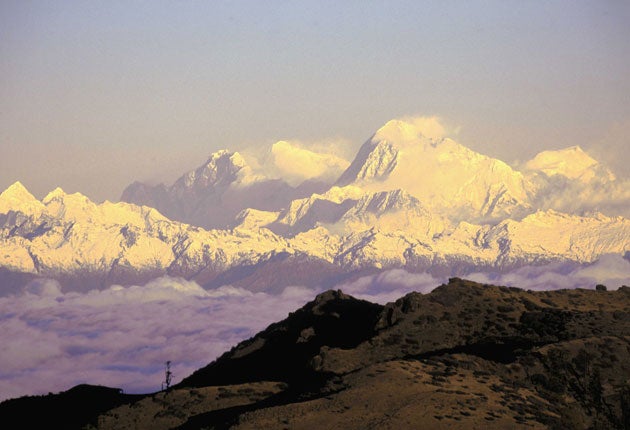Crime rate sky high at the top of the world
Police presence bolstered to tackle prostitution, theft and gambling on Everest

The world's highest crime wave has prompted the Chinese to strengthen their police presence on the slopes of Mount Everest.
Prostitution, theft and gambling are becoming a major problem on the mountain's once pristine northern slopes, and the local constabulary has stepped up public security at a dizzying 17,060ft (5,200m) above sea level.
"We used to just have one police post on the north side of the Everest area, and that was a three-room portable wooden hut. But the number of tourists has grown in recent years so the original police hut in a trailer didn't meet the needs of law and order and tourists' requirements any more," Zhang Shoucheng, director of Everest police station, told the Tibet Daily.
Much of the crime wave relates to the usual problems facing all visitors to the world's loftiest tourist spots. Missing oxygen bottles, stolen rucksacks and ropes and equipment are a hazard for people visiting the area. Tour guides selling bad information or dodgy package tours are also a problem. More dangerous are those selling fake oxygen bottles to the growing number of tourists visiting the area.
Prostitutes ply their trade in the camps, which are more like small villages, and there are gambling dens as well as any number of hawkers. A decision was made to upgrade the police hut to a fully-fledged police station and border patrol office. The new police station is manned by a team of more than 20 policemen, border officers and soldiers.
Tibetan activists complain that China is overwhelming indigenous culture in Tibet, and they say the train and the road to Everest base camp will make it easier for Beijing to keep a tight grip on Tibet. Chinese troops entered the isolated Himalayan region in 1950.
According to Chinese media, more than 40,000 people visited the mountain from the Chinese side last year, an all-time record figure. A total of 514 people reached the summit of the mountain last year from both the Tibetan and Nepali sides, up from the previous record of 480 in 2006.
For Tibetan activists, the increased security presence is less about helping tourists than it is about keeping the border between China and Nepal, which Mount Everest straddles, tightly sealed. Mountain passes in the area are used by Tibetans who cross over in hopes of joining exiled Tibetans in Nepal and India and studying at schools operating free of Chinese political interference.
It has been made easier to visit the area after the introduction of the world's highest railway to Lhasa a couple of years back and the Chinese government recently started construction of a road to Everest Base Camp. Environmentalists are worried that making it easier to reach the slopes could cause a lot of ecological damage.
Border patrols would also be carried out from the station. Chinese border guards have orders to stop any efforts to escape by this route and, in October 2006, border guards were filmed by Western hikers in the area firing at and apparently killing at least one Tibetan making the perilous crossing.
Join our commenting forum
Join thought-provoking conversations, follow other Independent readers and see their replies
Comments
Bookmark popover
Removed from bookmarks